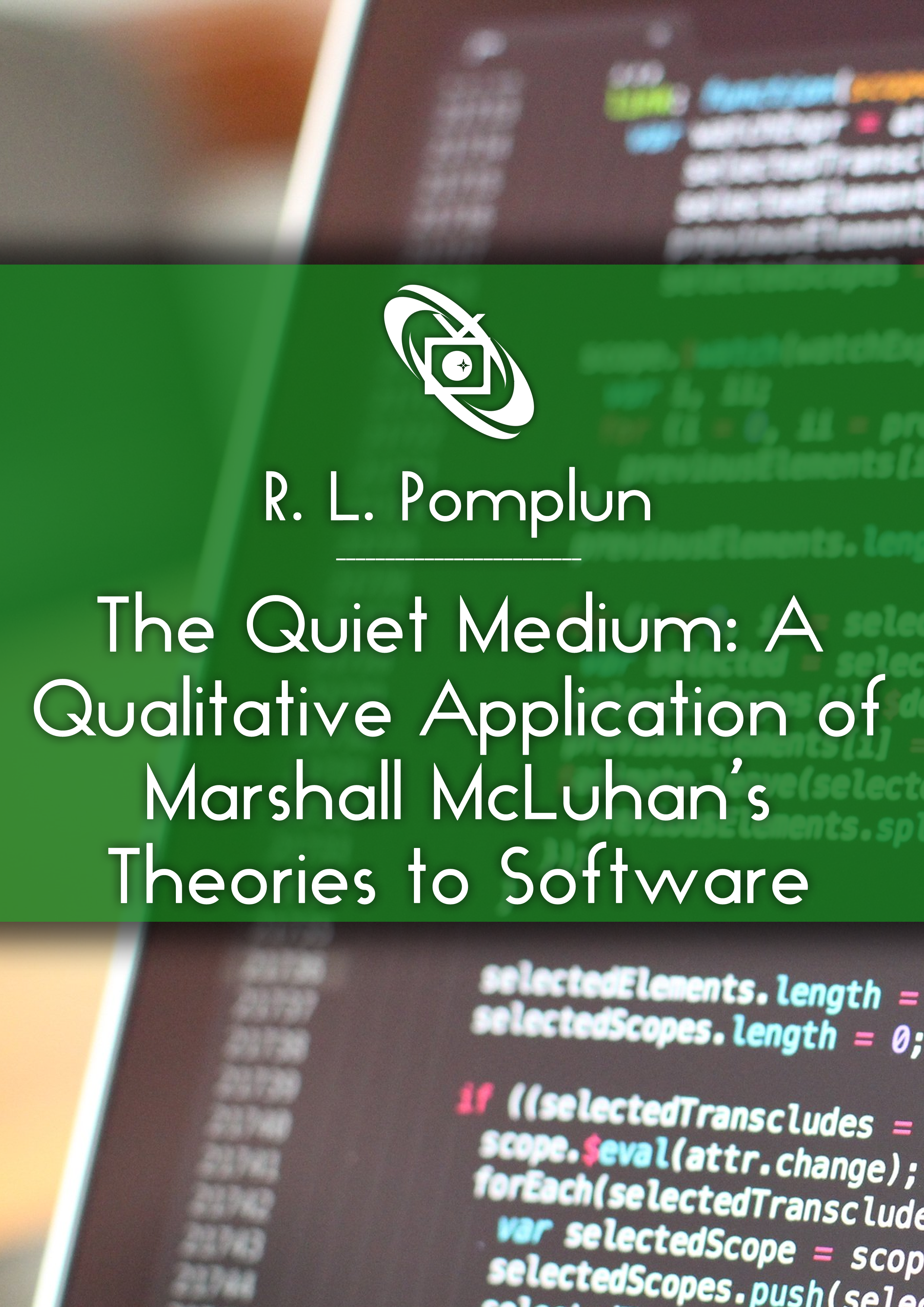Abstract
Software dominates the current state of society, yet, it does not receive much attention as being a vastly influential medium (Manovich, 2013). This paper analyses software in the context of Marshall McLuhan’s statement, “the medium is the message” (1964, p. 7). Hereby, I investigate and question Lev Manovich’s statement that “software is the message”, which he intended as an approach to update McLuhan’s ideas in Understanding Media (1964). Does Manovich challenge the idea of software not being a medium? In the process of my analysis, I draw on McLuhan’s theories in a wider context of his general work, the focus, however, lies upon the background of the “the medium is the message”. My aim is to test Manovich’s theories in saying that software is such a pioneering medium which is so different from all previous media that McLuhan’s theory of the medium being the message needs to be rethought. Software is an influencing and powerful technology that dominates and revolutionizes the contemporary cultural landscape. However, I argue, it could still be regarded within the framework suggested by McLuhan in the 1960s, and any claim that software is a different form of media, such as for example in the works of Lev Manovich, are overestimated. The paper offers a perspective on how past concepts around media can be applied to and interpreted in contemporary media.
References
Barker, T. (2012). Time and the Digital. Hanover, New Hampshire: Dartmouth College Press.
BBC Radio 4 (2019). The Medium is the Message. [video] Retrieved from https://www.youtube.com/watch?v=Ko6J9v1C9zE
BBC Science Focus Magazine. (2018). How Ada Lovelace's notes on the Analytical Engine created the first computer program. Retrieved from https://www.sciencefocus.com/future-technology/how-ada-lovelaces-notes-on-the-analytical-engine-created-the-first-computer-program/
Berry, D. (2011). The Philosophy of Software: Code and Mediation in the Digital Age. London: Macmillan.
Bobbitt, D. (2011). Teaching McLuhan: Understanding Understanding Media. Retrieved from Enculturation.net. http://enculturation.net/teaching-mcluhan
Brown, D. (1998). Cybertrends. London: Penguin Books.
Chatfield, T. (2013). Netymology. London: Quercus.
Cramer, F. (2005). Words Made Flesh. Rotterdam: Piet Zwart Institute.
Culkin, J. (1967). A Schoolman's Guide to Marshall McLuhan. The Saturday Review, pp.51-53, 70-72.
de Vries Hoogerwerff, M. (2014). The Software is the Message. Retrieved from Masters of Media https://mastersofmedia.hum.uva.nl/blog/2014/09/10/the-software-is-the-message/
Eudaimonia (2016). The Medium is the Message by Marshall McLuhan | Animated Book Review. [video] Retrieved from https://www.youtube.com/watch?v=gCr2binb4Fs
Folding Ideas (2015). Minisode - The Medium is the Message. [video] Retrieved from https://www.youtube.com/watch?v=OseOb_wBsi4
Friesner, N. (2005). A Review of Method is the Message: Rethinking McLuhan through Critical Theory. Retrieved from Cyberartsweb.org. http://www.cyberartsweb.org/cpace/infotech/mcluhan1.html
Fuller, M. (2008). Software Studies. Cambridge, Massachusetts London, England: The MIT Press.
Grosswiler, P. (1998). Method is the Message: Rethinking McLuhan through Critical Theory. Montreal: Black Rose Books.f
Harris, S. (2019). Digital Capitalism: A Conversation with Douglas Rushkoff. [podcast] Retrieved from Making Sense. https://samharris.org/podcasts/146-digital-capitalism/
Harris, T. (2016). How Technology is Hijacking Your Mind — from a Former Insider. Retrieved from Medium https://medium.com/thrive-global/how-technology-hijacks-peoples-minds-from-a-magician-and-google-s-design-ethicist-56d62ef5edf3
Kemp, S. (2019). Digital 2019: Global Internet Use Accelerates. Retrieved from We Are Social. https://wearesocial.com/blog/2019/01/digital-2019-global-internet-use-accelerates
Kennedy, S. (2019). Chaos media: a sonic economy of digital space. London: Bloomsburry Academic.
Kittler, F. (1995). There is no software. Ctheory (18 Nov 1995).
Levinson, P. (2006). Digital McLuhan. London: Routledge.
LicenceDashboard (2017). The History of Software. [video] Retrieved from https://www.youtube.com/watch?v=au-gE-Ohbhg
Manovich, L. (2013). "Software is the Message". Retrieved from Lab.softwarestudies.com. http://lab.softwarestudies.com/2013/12/software-is-message-new-mini-article.html
Manovich, L. (2013). Software takes command. New York London: Bloomsbury.
Manovich, L. (2002). The Language of New Media. Cambridge, Massachusetts London, England: The MIT Press.
McLuhan, M. and McLuhan, E. (1988). Laws of Media. Toronto Buffalo London: University of Toronto Press.
McLuhan, M. (2001). Understanding media. London: Routledge.
McLuhan Galaxy. (n.d.). Marshall McLuhan on Computers & the Future Internet. Retrieved from https://mcluhangalaxy.wordpress.com/2014/10/07/marshall-mcluhan-on-computers-the-future-internet/
mywebcowtube (2011). Marshall Mcluhan Full lecture: The medium is the message - 1977 part 1 v 3. [video] Retrieved from https://www.youtube.com/watch?v=ImaH51F4HBw
Negroponte, N. (1995). Being Digital. Chatham, Kent: Hodder and Stoughton.
Owen, J. (2015). How Software is Made. [video] Retrieved from https://www.youtube.com/watch?v=bWdeGTJxMQc
Paterson, M. and Higgs, J. (2005). Using Hermeneutics as a Qualitative Research Approach in Professional Practice. The Qualitative Report, 10(2), 339 - 357.
Pinkston, W. (2017). Marshall Mcluhan - Understanding Media. [video] Retrieved from https://www.youtube.com/watch?v=OpexbEcsN2A
Rodowick, D. N. (2001). Reading the Figural, or, Philosophy after the New Media. Durham & London: Duke University Press.
Rouse, M. (2016). What is software?. Retrieved from SearchMicroservices https://searchmicroservices.techtarget.com/definition/software
Rushkoff, D. (1994). Cyberia: Life in the Trenches of Hyperspace. London: Flamingo Original.
Rushkoff, D. (2010). Program or be Programmed. New York: OR Books.
Slouka, M. (1996). War of the Worlds: Cyberspace and the high-tech assault on reality. London: Abacus.

This work is licensed under a Creative Commons Attribution-NonCommercial-NoDerivatives 4.0 International License.

